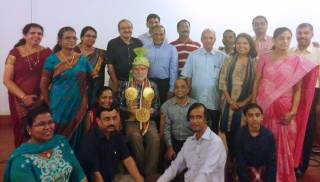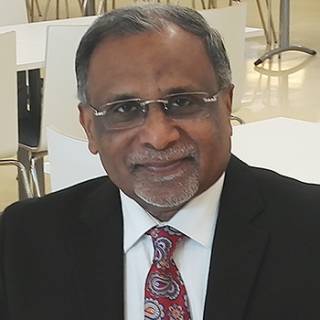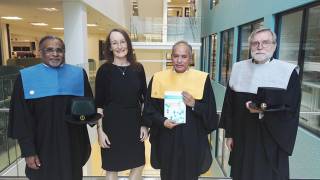Epidemiology programme celebrates a quarter of a century of transnational education

IPPE’s alumni meeting in India in 2015. Professor Matti Hakama, the creator of the doctoral programme, sits in the middle decorated and surrounded by alumni and other students. – Photo: IPPE
In May, the International Doctoral Programme of Epidemiology (IPPE) celebrated its 25th anniversary. Those years tell a unique story about internationalisation.
The IPPE was founded at the University of Tampere (UTA) in 1990 as a part of the development cooperation between Finland and India. At the beginning of 1990, education in cancer epidemiology and biostatistics was weak in India, which meant that the operation of cancer registries – and thus cancer control – was limited. To overcome this problem, Professor Matti Hakama founded the IPPE. From the beginning, the cooperation between the cancer registries of Finland and India has been an integral part of the programme.
Since its beginnings, the IPPE has extended internationally and educated doctoral students from Asia, North America, Europe and Africa. The main objectives of the programme are to increase the knowledge and understanding of major health problems and to improve public health capacity – particularly in low-income countries – by training epidemiologists and public health personnel. The programme is open to applications every other year, and the IPPE’s students have come from thirty two different countries. Moreover, more than fifty doctors have graduated from the programme so far. The IPPE’s thirteenth group will begin their studies next autumn.
High-quality research training
“The programme offers research training primarily for students from low-income countries,” Professor of Epidemiology Pekka Nuorti says.
“We teach them how to do research in their own country and to make a contribution there. In a way, this is transnational education, but it happens the other way around usually! They get their education here and then take their knowledge and skills back to their home country where their work has a great impact,” he explains.

Cherian Varghese, an IPPE alumnus from India, participated in the IPPE – 25 years of international doctoral education seminar as a guest speaker. He graduated from the programme in 2000 and has since worked for the World Health Organization around the world, including in the Philippines, Fiji, and Switzerland, where he is currently working. Varghese emphasises the significance of his education at the University of Tampere for his own career and more generally.
“One of the main outcomes of this programme is that it has furthered the development of cancer epidemiology in India, because it has increased the number of highly qualified people. In addition, almost all the students who have graduated from Tampere have achieved leading positions in India and become, for instance, the directors of various cancer registries. They still continue to use the knowledge and skills they acquired at UTA”, Varghese says.
According to Nuorti, the contents and processes of the programme have been developed and unified over the last five years. The programme now includes almost all of the research groups in health sciences at UTA, and a wide selection of courses is offered to all students of the faculty. By studying with international students, Finnish students gain experience of internationality and international research cooperation.
Compact, flexible and human
In Nuorti’s opinion, the IPPE’s greatest assets are its flexibility and strong research groups.
“The IPPE is able to compete with other programmes around the world because in a relatively small programme, we can be flexible and customise the content according to the students’ goals and needs,” Nuorti says.
“The IPPE is globally unique. The reasons for this are its concept and extensive networks, and the fact that it is held in high regard internationally. However, the foundation of everything is the people who conduct the research, teach in the programme and provide the preconditions for internationality,” he continues.
Varghese thanks the University of Tampere for its investment in the students, and the programme for its human touch.
“The entire university helps you to achieve your goal. Teachers join the students on their journey, go through all the phases and help with everything in every possible way. In the doctoral programme, the atmosphere was warm and friendly, and there was a connection between the students and teachers. This makes the programme so great. I hope the programme will also maintain its human touch in the future,” Varghese says.

Diverse internationalisation
According to Nuorti, the keys to the IPPE’s success are the strong and diverse international networks and the fact that – so far – doctoral programmes in Finland have had no tuition fees. The structure of the programme is also practical for international students.
“We have squeezed a 60 ECTS course into one academic year and given the students the opportunity to continue working on their doctoral dissertations in their home country. This makes the programme feasible for those students who are working, for example, for a research institute in their own country. In this way, they do not have to quit their jobs and leave for years to study abroad. At the same time, the students are able to complete a high-quality doctoral degree, which helps them to move forward in their careers,” Nuorti explains.
“These processes work for both students and teachers. We have also invested a lot in what happens after the students have spent their year in Tampere. The continuity of supervision is very important,” Nuorti adds.
Internationality is an essential part of the IPPE and it is based on long-term work.
“At the University of Tampere, the IPPE furthers internationalisation in many ways. International students can become a part of our research groups, and through the development of cooperation networks, new opportunities for exchange studies and collaborative projects for teachers and students also become available. Through the IPPE, we also bring international experts to Tampere,” Nuorti says.
Both Varghese and Nuorti consider the IPPE to be a doctoral programme unlike any other.
“Over twenty-five years of systematic and research-oriented education in epidemiology by one university in one country and the great number of international students is something really magnificent. The University of Tampere and this programme should be more famous internationally, especially in terms of how all this has been achieved,” Varghese argues.
Text: Anna Ojalahti
Photographs: IPPE
programme:
Chair: Professor Pekka Nuorti
- 12.15 Opening words, Pekka Nuorti, Chair
- 12.25 Greetings from the Faculty of Social Sciences, Juha Teperi, Dean
- 12.45 The vision of the founder; DPPH and IPPE, Timo Hakulinen, Professor Emeritus / Former director of DPPH
- 13.05 Collaboration with Cancer Foundation Finland, Nea Malila, Professor of cancer epidemiology / Head of the Finnish Cancer Registry
- 13.20 History of IPPE, Matti Hakama, Professor Emeritus
- 13.50 Alumni student IPPE 1999, Dr. Cherian Varghese, India
- 14.15 Alumni student IPPE 2007, Dr. Bright Nwaru, Nigeria
- 14.30 Coffee
- 15.00 Alumni student IPPE 2009, Dr. Tuvshinjargal Chimed, Mongolia
- 15.15 Current student IPPE 2015, PhD student Mark Francis, India
- 15.30 Alumni IPPE 1993, Dr. Irena Rogovska, Latvia
- 15.45 Greetings from the UTA Rectorate, Vice-rector Seppo Parkkila
- 16.00 Future of the IPPE programme, Pekka Nuorti, Head of IPPE
- 16.20 Closing and discussion, Pekka Nuorti, Chair
- 16.30 – Get Together
